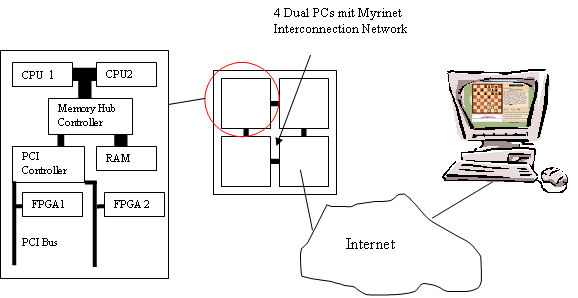Hydra (chess computer)
Hydra is a chess computer that was developed by the Austrian Christian "Chrilly" Donninger , the Germans Ulf Lorenz and Christopher Lutz and the company PAL Computer Systems from Abu Dhabi .
history
A forerunner of the program was called Brutus and was commissioned by ChessBase . After the disappointing performance of an early version at the 2003 World Computer Chess Championship in Graz , ChessBase did not pursue the project any further because it was not seen as being commercially viable. The Hydra team then succeeded in finding a new financier in the United Arab Emirates' PAL Computer Systems .
successes
The partly new, partly further developed program Hydra beat the multiple computer chess world champion Shredder in 2004 in a competition in Abu Dhabi with 5.5: 2.5. In the same year, the program scored 3.5 points from four games in a comparison match against top players in the world in Bilbao . In June 2005 Hydra achieved a surprisingly high competitive victory over the English world class player Michael Adams with 5.5: 0.5 in London . Hydra has never been beaten by a human chess player in a tournament game (as of August 2006). Only in correspondence chess did the program lose a match in 2005 against the Berlin correspondence chess grandmaster Arno Nickel with 0.5: 2.5. Hydra was also used in freestyle chess , an online type of chess in which computer analysis is allowed. Its owner from Abu Dhabi, who appears under the pseudonym Zorchamp , played with Hydra in three tournaments in 2005 and 2006 and achieved different successes. The last time he failed to qualify for the final round was in June 2006 after winning the 2nd PAL / CSS Freestyle Tournament in April 2006 . As early as 2005, the developers stated a skill level of over 3000 Elo points .
hardware
Hydra consists of a computer cluster running under Linux , currently 32 Intel Xeon processors, which generate the search tree, and 32 FPGA cards, which evaluate the positions and report them back to the program. The most sensitive part of Hydra's search algorithm runs on the aforementioned Xeon processors, which are connected to one another via a Myrinet high-speed network. Each processor operates its own FPGA card, and the sequence of the distributed algorithm is basically as follows: One of the processors gets the current position and starts a sequential alpha-beta search . The other processors randomly send work requests around the network, and if a processor that is already working meaningfully on the current chess problem catches such a request, it gives up a sub-problem of its own (sub-) problem. With the help of a clever messaging system between the processors, the work to be done is dynamically balanced and there is only a low search overhead . After a while, all processors have something useful to do, and each individual processor evaluates chess positions in its search tree with the help of its FPGA “coprocessor”. A Hydra processor generates approximately 100,000 small searches on an FPGA card per second.
The advantage of the FPGA card itself is that a complex, knowledge-based evaluation function can be implemented without significantly affecting the search speed. The program can currently search and rate around 200 million positions per second. This makes it around 100 times faster than chess software on a standard PC. The following picture shows a schematic representation of the hydraulic hardware.
Opening library
The German grandmaster Christopher Lutz is responsible for the Hydra opening book . In contrast to other programs, whose opening repertoire is based on games played by chess masters, it is not very extensive, as the program can often calculate better moves independently.
Web links
- Hydrachess. (No longer available online.) Formerly in the original ; accessed on April 2, 2020 . ( Page no longer available , search in web archives )
- C. Donninger, U. Lorenz: The Chess Monster Hydra. Proc. of 14th International Conference on Field-Programmable Logic and Applications (FPL), 2004, Antwerp - Belgium, LNCS 3203, pp. 927-932 doi : 10.1007 / 978-3-540-30117-2_101
- C. Donninger, A. Kure, U. Lorenz. Parallel Brutus: The First Distributed, FPGA Accelerated Chess Program. IPDPS 2004. doi : 10.1109 / IPDPS.2004.1302962
- C. Donninger, U. Lorenz: Innovative Opening Book Handling. ACG 2006: 1-10 doi : 10.1007 / 11922155_1
